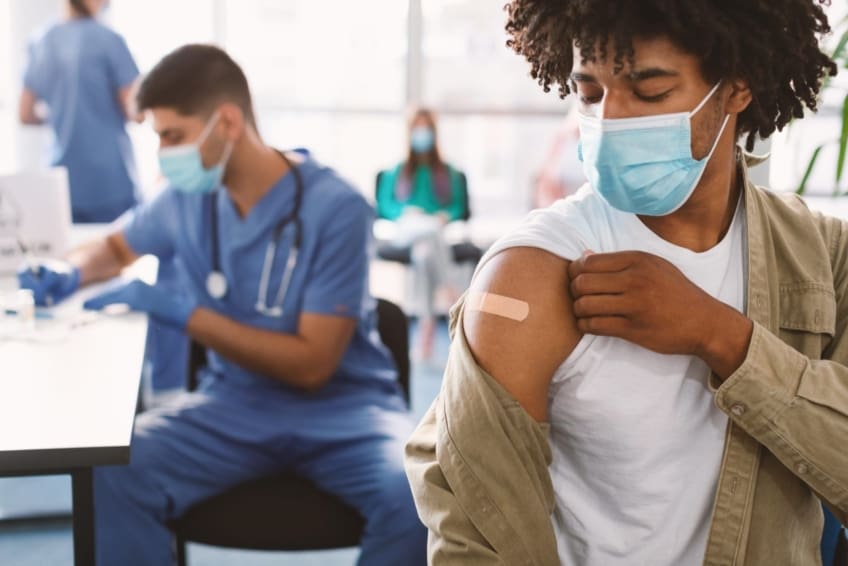
COVID-19 is a serious health crisis in U.S. communities and across the globe. Since it was first identified in late 2019, COVID-19, which is caused by the coronavirus, has evolved into more powerful strains. This includes the powerful Delta variant.
The Delta variant causes more serious infections, spreads faster and is more contagious. It is nearly twice as contagious as the original COVID-19 variant. Unvaccinated people are at an even higher risk of contracting the Delta variant and spreading it to others.
Fully vaccinated people who have contracted the Delta variant via breakthrough cases (testing positive for COVID-19 after being fully vaccinated) can spread the virus to others. However, the infection is less severe in people who have been fully vaccinated. They are less likely to be hospitalized or die from the infection.
Path to Improved Health
COVID-19 prevention strategies are effective in stopping the spread of the virus and ending the pandemic. The current focus is on “layered mitigation strategies.” This involves multiple ways to reduce the spread, including:
- Vaccination
- Masking
- Social distancing
- Testing
- Case investigation/contact tracing
- Quarantine/isolation
Vaccination
Getting vaccinated is the most powerful tool to protect against COVID-19. Three vaccines have been proven effective in avoiding contracting and reducing the severity of the virus. Getting vaccinated means you are less likely to be hospitalized or die from COVID-19. Data also shows the vaccines are effective against contracting the Delta variant, thereby reducing your risk.
When you get vaccinated, it is critical that you complete the entire series. That means two doses for those who got the Pfizer and Moderna vaccines and one dose for those who got the Johnson & Johnson vaccine.
The CDC is recommending booster shots for those who have been fully vaccinated for COVID with either the Pfizer or Moderna vaccines but who have compromised or weakened immune systems. They sometimes do not build enough protection with the first dose, so a booster may be needed.
Officials are also considering booster shots for everyone already fully vaccinated with either the Pfizer or Moderna vaccines. If approved, the plan is expected to begin in the fall. You may be eligible for a booster starting 8 months after you received your second dose of the vaccine.
Most cases of severe disease, hospitalization and death continue to occur among those not yet vaccinated at all.
Masking
In public, indoor settings with substantial and high transmission, everyone (including fully vaccinated people) should wear a mask. This will help prevent the spread of the Delta variant and protect others.
Social Distancing
When gathering with others, allow at least 6 feet of distance between yourself and others who do not live in the same household.
When you are at home, avoid close contact with people who are sick. If possible, allow at least 6 feet between the person who is sick and other household members.
When you are outside your home, allow at least 6 feet of distance between yourself and people who don’t live in your household. Remember that infected people without symptoms are still able to transmit the virus to others
Testing
If you or anyone you care for has signs or symptoms of COVID-19, get tested immediately. Avoid others while awaiting the results, even if you are fully vaccinated. The CDC has school and workplace testing recommendations. Contact your school or workplace to find out requirements for testing you or those you care for.
Case Investigation / Contract Tracing
Local and state health departments have created databases to document cases of COVID-19. These databases also are critical to alerting people to possible exposure to the virus. If you are concerned about whether you have been exposed or have exposed others to COVID-19, contact your local health department.
As schools and institutions of higher education resume in-person learning, case investigation and contact tracing are effective strategies to identify people infected with SARS-COV-2, the virus that causes COVID-19, and to reduce transmission.
Quarantine / Isolation
If you have tested positive for COVID-19 or its symptoms, isolate and quarantine yourself immediately. Quarantine means to stay home. Isolation means to stay away from other people, including family. If your symptoms are not severe and you can stay at home, stay in a room separate from others that can be closed off by a door. Arrange to communicate through phone/text or talking through the door. Ask family members to leave food, supplies, or medicine outside your door and to check on you regularly.
Things to Consider
The Delta variant is currently the most dominant strain of COVID-19. As the pandemic continues, other, stronger strains will likely develop. That’s why it’s important to get vaccinated. The vaccine is free and widely available in every U.S. community. Children younger than 12 are not currently eligible for vaccination. As such, it’s important to wear masks around children in this age group, even if you are fully vaccinated.
Questions to Ask Your Doctor
- Are there any risks associated with vaccination?
- Should I get a vaccine booster?
- Will testing tell me if I have the Delta variant?
- Will vaccination help me avoid hospitalization and death?
Resources
Centers for Disease Control and Prevention: Delta Variant: What We Know About the Science
![]()
Copyright © American Academy of Family Physicians
This information provides a general overview and may not apply to everyone. Talk to your family doctor to find out if this information applies to you and to get more information on this subject.







